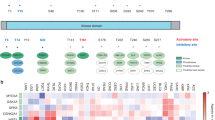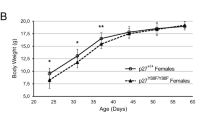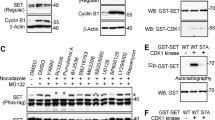Abstract
The AKT2 oncogene encodes a protein-serine/threonine kinase containing a pleckstrin homology domain characteristic of many signaling proteins. Recently, it was shown that AKT2 kinase activity can be induced by platelet-derived growth factor through phosphatidylinositol-3-OH kinase, suggesting that AKT2 may be an important signal mediator that contributes to the control of cell proliferation. We previously reported amplification and overexpression of AKT2 in human cancers. To investigate the transforming activity of AKT2, we used a retrovirus-based construct to express AKT2 in NIH3T3 cells. Overexpression of AKT2 was found to transform NIH3T3 cells, as determined by growth in soft agar and tumor formation in nude mice. The oncogenic activity of AKT2 was diminished by truncation of a 70-amino acid proline-rich region at the carboxyl-terminus. To facilitate the characterization of AKT2, we generated monoclonal and polyclonal antibodies against this protein. AKT2 was localized to the cytoplasm by cell fractionation experiments, immunocytochemistry, and immunofluorescence. Protein levels were more abundant in mitotic cells than in interphase cells. Western blot analysis of synchronized pancreatic cancer cells demonstrated that the expression level of AKT2 protein in mitotic cells is three to fivefold higher than in their interphase counterparts. A time-course study of phytohemagglutinin-stimulated lymphocytes revealed that AKT2 mRNA and AKT2 protein levels are highest 48 – 72 h after addition of mitogen, when cells are actively dividing. These data suggest that AKT2 could play a significant role in cell cycle progression and that the oncogenic activity of overexpressed AKT2 may be mediated by aberrant regulation of cellular proliferation.
This is a preview of subscription content, access via your institution
Access options
Subscribe to this journal
Receive 50 print issues and online access
$259.00 per year
only $5.18 per issue
Buy this article
- Purchase on Springer Link
- Instant access to full article PDF
Prices may be subject to local taxes which are calculated during checkout
Similar content being viewed by others
Author information
Authors and Affiliations
Rights and permissions
About this article
Cite this article
Cheng, J., Altomare, D., Klein, M. et al. Transforming activity and mitosis-related expression of the AKT2 oncogene: evidence suggesting a link between cell cycle regulation and oncogenesis. Oncogene 14, 2793–2801 (1997). https://doi.org/10.1038/sj.onc.1201121
Received:
Revised:
Accepted:
Issue Date:
DOI: https://doi.org/10.1038/sj.onc.1201121
Keywords
This article is cited by
-
Opposing roles of the oncogene Akt isoforms in tumour progression: is there a dark side to Akt pathway inhibition?
Journal of Chemical Biology (2012)
-
Phase I pharmacokinetic and pharmacodynamic study of triciribine phosphate monohydrate, a small-molecule inhibitor of AKT phosphorylation, in adult subjects with solid tumors containing activated AKT
Investigational New Drugs (2011)
-
NPD1 Induction of Retinal Pigment Epithelial Cell Survival Involves PI3K/Akt Phosphorylation Signaling
Neurochemical Research (2010)
-
Two specific inhibitors of the phosphatidylinositol 3-kinase LY294002 and wortmannin up-regulate β1,4-galactosyltransferase I and thus sensitize SMMC-7721 human hepatocarcinoma cells to cycloheximide-induced apoptosis
Molecular and Cellular Biochemistry (2007)
-
The human homologue of the RNA polymerase II-associated factor 1 (hPaf1), localized on the 19q13 amplicon, is associated with tumorigenesis
Oncogene (2006)



